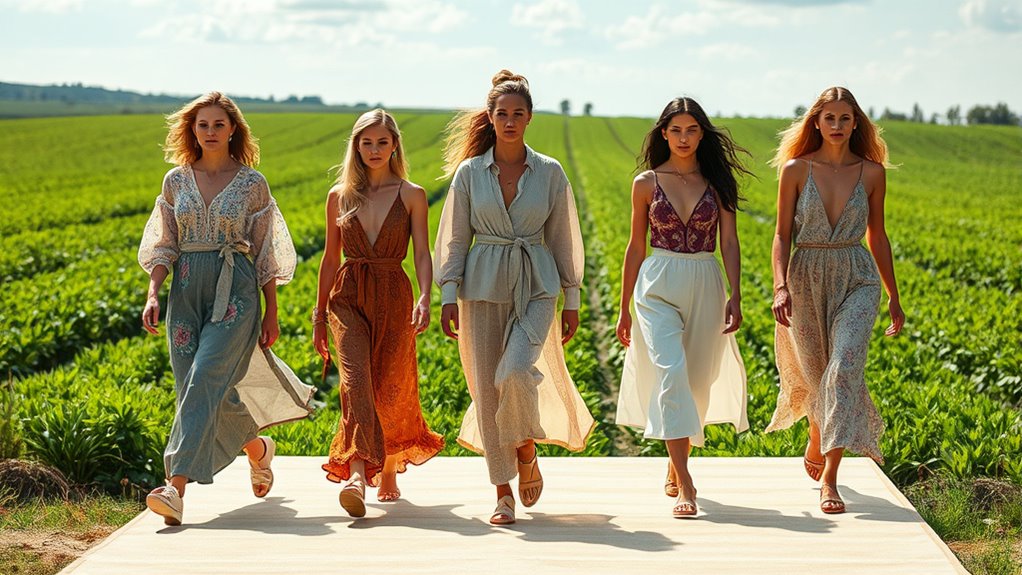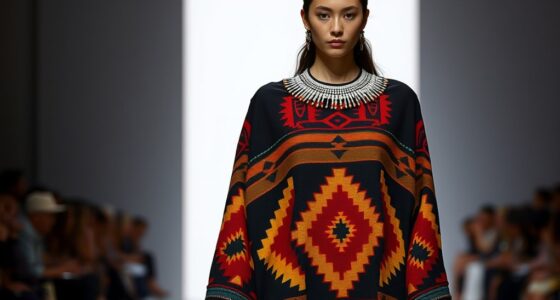You can drive change by supporting ethical fashion movements that connect regenerative agriculture directly to runway collections. Focus on brands prioritizing sustainable supply chains, fair labor practices, and transparent reporting. Technologies like blockchain help verify ethical sourcing, building trust between you and designers committed to responsibility. By choosing responsible options, you push the industry toward more eco-friendly and fair practices. Keep exploring how these movements are shaping the future of fashion, ensuring sustainability and fairness at every step.
Key Takeaways
- Regenerative agriculture enhances sustainable raw materials, reducing environmental impact from farm to fashion supply chain.
- Ethical fashion movements promote transparency and accountability in sourcing, production, and labor practices.
- Innovative technologies like blockchain enable traceability from farm to runway, verifying ethical and eco-friendly origins.
- Consumer awareness and demand drive brands to adopt responsible practices, supporting fair labor and eco-conscious materials.
- Industry collaborations and policies foster widespread adoption of regenerative principles and ethical standards in fashion.

Have you ever wondered how the fashion industry can become more responsible and sustainable? The answer lies in adopting ethical practices that prioritize not just style, but also social and environmental well-being. One of the most impactful ways to achieve this is by building sustainable supply chains. When brands focus on sourcing materials responsibly, they reduce environmental harm and ensure transparency throughout the production process. This means working closely with suppliers who follow eco-friendly methods, use renewable resources, and minimize waste. By establishing sustainable supply chains, you help create a system where the environment isn’t sacrificed for profit, and consumers can trust that what they buy is ethically produced.
Building sustainable supply chains ensures ethical, eco-friendly fashion that consumers can trust.
Equally important is ensuring fair labor practices. Ethical fashion isn’t just about eco-conscious materials; it’s about respecting the people behind every stitch and seam. Fair wages, safe working conditions, and reasonable hours are non-negotiable principles. When brands commit to fair labor practices, they empower workers and promote dignity in the workplace. This effort helps combat exploitation and child labor, which unfortunately still occur in parts of the fashion supply chain. As a consumer, supporting brands that prioritize fair labor practices means you’re advocating for a more just world where workers are valued and protected.
Incorporating these ethical standards into your shopping habits can be straightforward. Look for brands that are transparent about their supply chains and labor policies. Many companies now publish detailed reports or certifications that verify their commitment to sustainability and fairness. By choosing these brands, you contribute to a demand for responsible production. Additionally, supporting local artisans or small-scale producers can reduce the complexity of supply chains, making it easier to verify ethical practices. Understanding testing tools used in quality assurance can also help consumers recognize credible certifications and transparency efforts.
The movement toward ethical fashion also encourages innovations like blockchain technology, which can track products from farm to wardrobe, providing proof of ethical sourcing and fair labor. This transparency builds trust between brands and consumers, fostering a culture of accountability. As you become more aware of these issues, you can influence the industry by making conscious choices, urging larger brands to adopt more responsible practices, and advocating for policies that enforce ethical standards.
Ultimately, transforming the fashion industry requires a collective effort. Your purchasing decisions matter, and by prioritizing brands with sustainable supply chains and fair labor practices, you become part of a movement that’s reshaping fashion into a more ethical, responsible industry. This shift not only benefits the environment and workers but also ensures that fashion remains a source of creativity and joy, without the hidden costs of exploitation or environmental degradation.
Frequently Asked Questions
How Can Consumers Verify the Sustainability Claims of Fashion Brands?
You can verify sustainability claims by researching the brand’s certifications, such as Fair Trade or GOTS, which provide credible proof of ethical practices. Check for transparent reporting on their website, including supply chain details and environmental impact. Look for third-party audits and reviews, and ask questions directly. Your consumer verification efforts help hold brands accountable, ensuring their sustainability claims are genuine and align with ethical fashion standards.
What Are the Main Challenges Faced by Regenerative Agriculture in Fashion?
You might think regenerative agriculture is a perfect solution, but soil degradation and limited crop diversity pose real challenges. Farmers often struggle to restore soil health while maintaining productivity. Balancing diverse crops without sacrificing yields is tough, especially with market pressures for uniform, quick-growing plants. These hurdles make it hard for the fashion industry to source truly sustainable, regenerative materials consistently, delaying progress toward eco-friendly fashion.
How Do Ethical Fashion Movements Impact Local Communities and Economies?
Ethical fashion movements boost local communities by promoting community empowerment and cultural preservation. When you support these initiatives, you’re helping communities gain control over their resources, create fair jobs, and sustain traditional crafts and practices. This fosters economic growth and strengthens cultural identity. Your choices encourage brands to prioritize transparency and fairness, ensuring that local artisans benefit directly, preserving their heritage while contributing to a more sustainable and equitable fashion industry.
Are There Certifications That Guarantee Ethical Practices in Fashion?
Yes, there are certification standards and ethical labels that guarantee ethical practices in fashion. When you look for products with certifications like Fair Trade, GOTS, or B Corp, you can trust they meet strict standards for fair labor, environmental sustainability, and ethical sourcing. These labels help you support brands committed to transparency, social responsibility, and sustainability, ensuring your fashion choices align with your values.
What Role Do Technological Innovations Play in Promoting Sustainable Fashion?
Oh, sure, technological innovations are just a fad, right? But in reality, they’re transforming fashion by introducing biodegradable dyes that reduce pollution and smart textiles that adapt to your needs while conserving resources. You might think these are just sci-fi ideas, but they actively promote sustainable fashion, making your wardrobe more eco-friendly. Embracing these innovations helps you support ethical practices without sacrificing style or functionality.
Conclusion
As you explore these ethical fashion movements, you realize the journey from regenerative agriculture to runway isn’t just a trend—it’s a shared hope for a better future. Coincidentally, your choices today can spark change, connecting you to a global community dedicated to sustainability. By choosing mindful fashion, you become part of a movement that nurtures the planet and empowers others. Together, your actions can transform style into a powerful act of kindness and responsibility.









